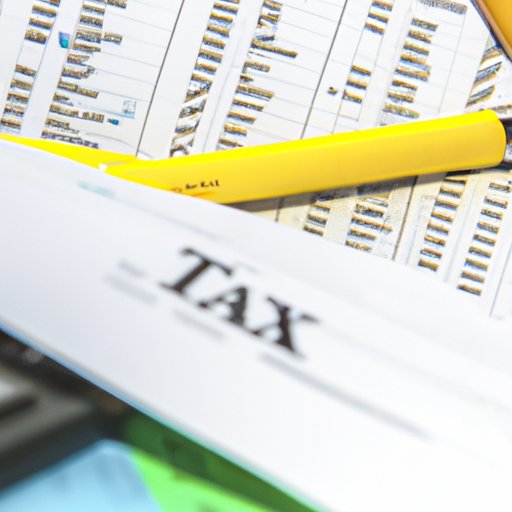Introduction:
Financial records are a vital part of any business operation. They provide a clear picture of the company’s financial health, enabling managers to make informed decisions and assess the success of their strategies. It is important for businesses to keep accurate financial records in order to remain compliant with government regulations, as well as to ensure that taxes are paid on time. In this article, we will explore what financial records are, their purpose, and how to manage them effectively.

Exploring the Basics of Financial Records
So, what exactly are financial records? Financial records refer to documents such as receipts, invoices, bank statements, payroll records, and other documents related to the finances of a business. These documents provide an accurate representation of the financial activities of a business, providing insights into its overall performance.
There are several types of financial records that businesses need to keep track of. These include income statements, balance sheets, cash flow statements, general ledgers, accounts receivable and payable, and annual reports. Each type of document provides a different perspective on the business’s finances, allowing for more comprehensive analysis.
Financial records can be used to analyze the financial health of a business, identify areas of improvement, and develop strategies for future growth. They can also be used to track expenses, calculate taxes, and monitor cash flow. Keeping accurate financial records is essential to running a successful business.

What You Need to Know About Financial Records
The primary purpose of financial records is to provide a clear picture of the financial activities of a business. This information can be used to assess the performance of the business, identify areas of improvement, and develop strategies for the future. Financial records are also used to calculate taxes, track expenses, and monitor cash flow.
Keeping accurate financial records has several benefits. It helps businesses stay organized and compliant with government regulations. It can also help them identify areas of waste, save money, and maximize profits. Additionally, accurate financial records can help businesses access loans and lines of credit.
It is important to note that there are some common mistakes made when it comes to financial records. The most common mistake is not keeping accurate records or not filing them in a timely manner. Additionally, failing to reconcile bank statements or not keeping up-to-date records can lead to errors and costly mistakes.

The Essential Guide to Financial Records
Organizing financial records is key to ensuring accuracy and efficiency. The best way to do this is to create a system that works for your business. This should include a filing system, a method for tracking expenses, and a process for reconciling bank statements. Additionally, it is important to store all financial documents in a secure location.
When creating a system for managing financial records, there are some best practices to follow. It is important to keep up-to-date records, review financial statements regularly, and back up all documents. Additionally, it is a good idea to keep digital copies of all documents in case of loss or theft.
Finally, here are some tips for organizing financial records: create a filing system, use labels and folders, set up an expense tracking system, and create a schedule for reconciling bank statements. Taking the time to create a system for managing financial records will save time and effort in the long run.
A Comprehensive Overview of Financial Records
Financial records come in many forms and provide a range of information. Some of the most common financial documents include invoices, receipts, bank statements, payroll records, and annual reports. Understanding how to read and interpret these documents is essential for making informed decisions about the finances of a business.
When reviewing financial records, there are a few key points to consider. Look for trends in income and expenses, identify areas of waste, and compare year-over-year performance. Additionally, it is important to look for any discrepancies between documents and investigate any suspicious activity.
Financial Records: A Necessary Part of Business Operations
Financial records are an essential part of managing a successful business. They provide insights into the financial activities of the business and enable decision-makers to make informed decisions. Accurate financial records are also necessary for staying compliant with government regulations and paying taxes on time.
It is important to keep financial records up-to-date. This means reconciling bank statements regularly, tracking expenses, and filing documents in a timely manner. Additionally, understanding the role of financial records in decision-making is essential for developing effective strategies and maximizing profits.
Conclusion:
In conclusion, financial records are essential for managing a successful business. They provide a clear picture of the financial activities of the business and enable decision-makers to make informed decisions. It is important to keep financial records up-to-date, maintain accurate records, and understand their role in decision-making. By following these guidelines, businesses can ensure that their financial records are accurate and up-to-date.
(Note: Is this article not meeting your expectations? Do you have knowledge or insights to share? Unlock new opportunities and expand your reach by joining our authors team. Click Registration to join us and share your expertise with our readers.)
